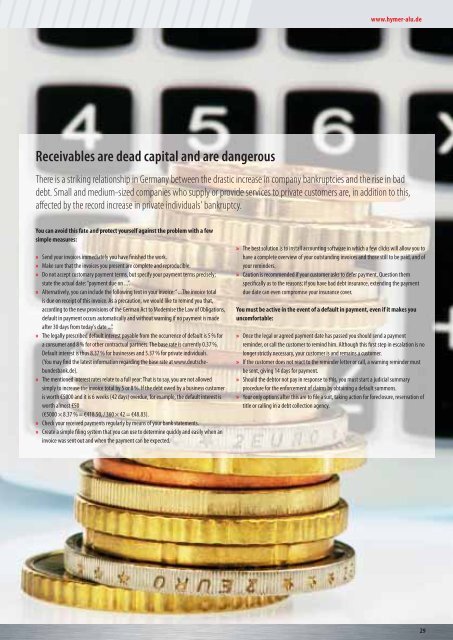TRUST MADE EASY.
TRUST MADE EASY.
TRUST MADE EASY.
You also want an ePaper? Increase the reach of your titles
YUMPU automatically turns print PDFs into web optimized ePapers that Google loves.
www.hymer-alu.de<br />
Receivables are dead capital and are dangerous<br />
There is a striking relationship in Germany between the drastic increase in company bankruptcies and the rise in bad<br />
debt. Small and medium-sized companies who supply or provide services to private customers are, in addition to this,<br />
affected by the record increase in private individuals' bankruptcy.<br />
You can avoid this fate and protect yourself against the problem with a few<br />
simple measures:<br />
» Send your invoices immediately you have finished the work.<br />
» Make sure that the invoices you present are complete and reproducible.<br />
» Do not accept customary payment terms, but specify your payment terms precisely;<br />
state the actual date: “payment due on ...”.<br />
» Alternatively, you can include the following text in your invoice: “ ... The invoice total<br />
is due on receipt of this invoice. As a precaution, we would like to remind you that,<br />
according to the new provisions of the German Act to Modernise the Law of Obligations,<br />
default in payment occurs automatically and without warning if no payment is made<br />
after 30 days from today's date ...”.<br />
» The legally prescribed default interest payable from the occurrence of default is 5 % for<br />
a consumer and 8 % for other contractual partners. The base rate is currently 0.37 %.<br />
Default interest is thus 8.37 % for businesses and 5.37 % for private individuals.<br />
(You may find the latest information regarding the base rate at www.deutschebundesbank.de).<br />
» The mentioned interest rates relate to a full year: That is to say, you are not allowed<br />
simply to increase the invoice total by 5 or 8 %. If the debt owed by a business customer<br />
is worth €5000 and it is 6 weeks (42 days) overdue, for example, the default interest is<br />
worth almost €50<br />
(€5000 × 8.37 % = €418.50, / 360 × 42 = €48.83).<br />
» Check your received payments regularly by means of your bank statements.<br />
» Create a simple filing system that you can use to determine quickly and easily when an<br />
invoice was sent out and when the payment can be expected.<br />
» The best solution is to install accounting software in which a few clicks will allow you to<br />
have a complete overview of your outstanding invoices and those still to be paid, and of<br />
your reminders.<br />
» Caution is recommended if your customer asks to defer payment. Question them<br />
specifically as to the reasons; if you have bad debt insurance, extending the payment<br />
due date can even compromise your insurance cover.<br />
You must be active in the event of a default in payment, even if it makes you<br />
uncomfortable:<br />
» Once the legal or agreed payment date has passed you should send a payment<br />
reminder, or call the customer to remind him. Although this first step in escalation is no<br />
longer strictly necessary, your customer is and remains a customer.<br />
» If the customer does not react to the reminder letter or call, a warning reminder must<br />
be sent, giving 14 days for payment.<br />
» Should the debtor not pay in response to this, you must start a judicial summary<br />
procedure for the enforcement of claims by obtaining a default summons.<br />
» Your only options after this are to file a suit, taking action for foreclosure, reservation of<br />
title or calling in a debt collection agency.<br />
29
















